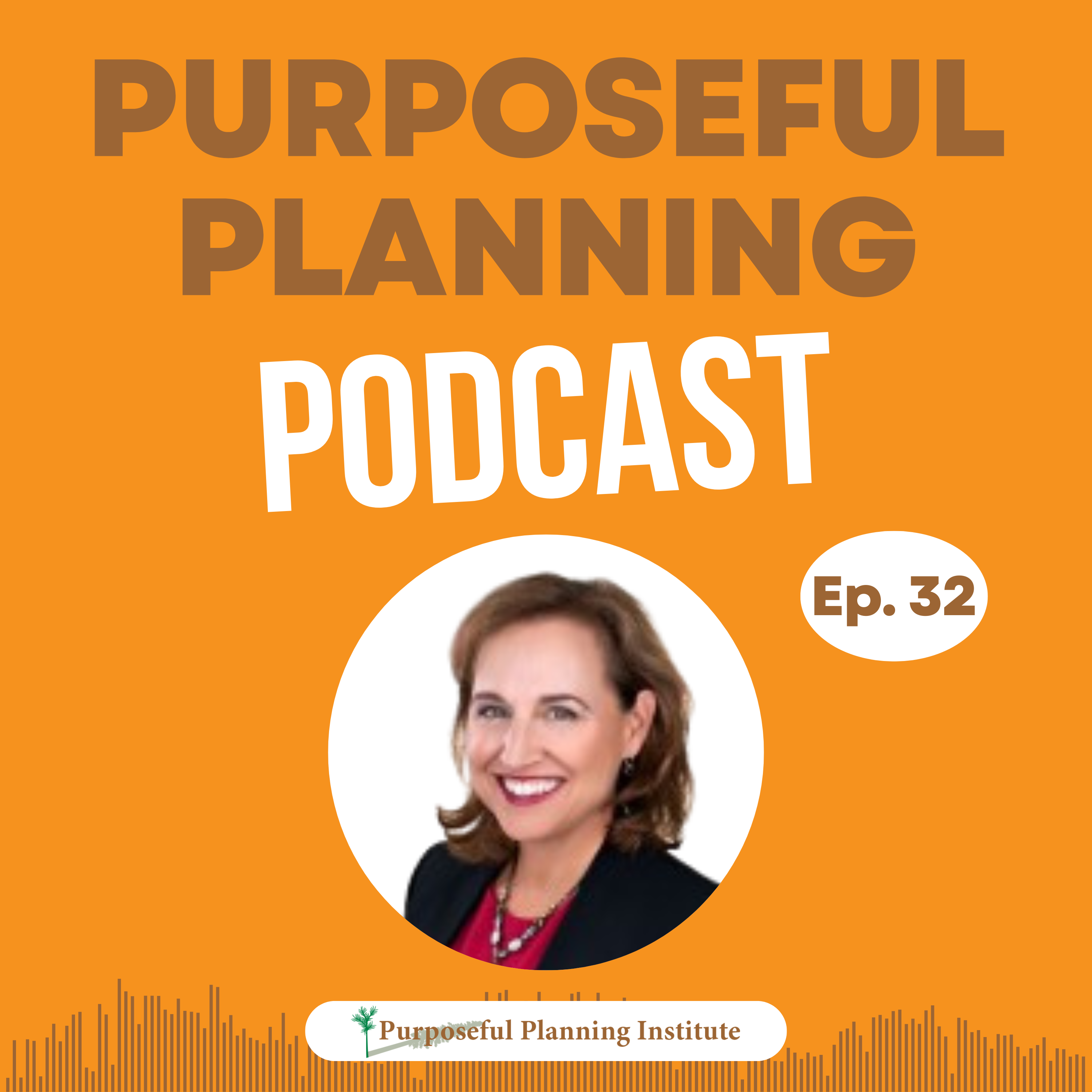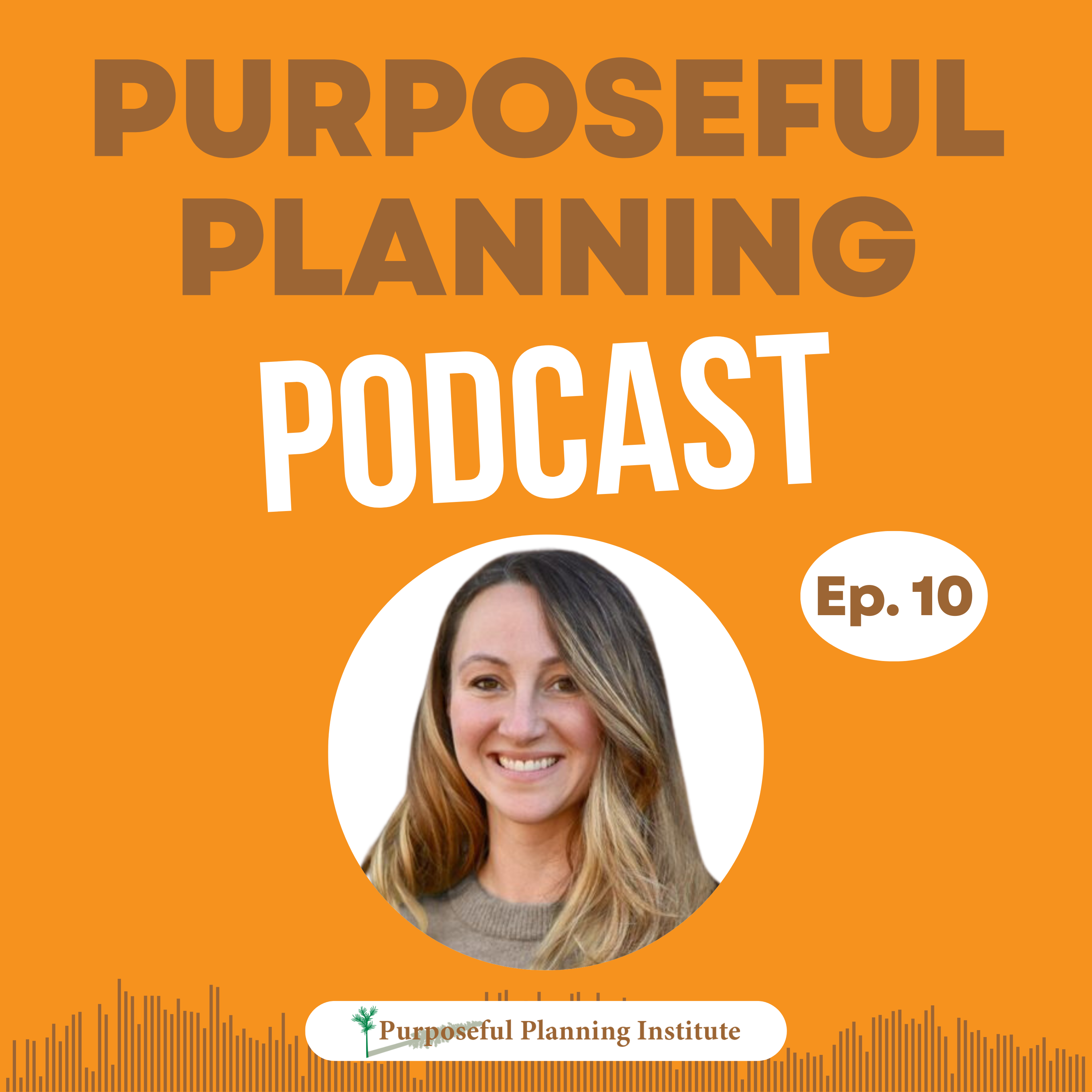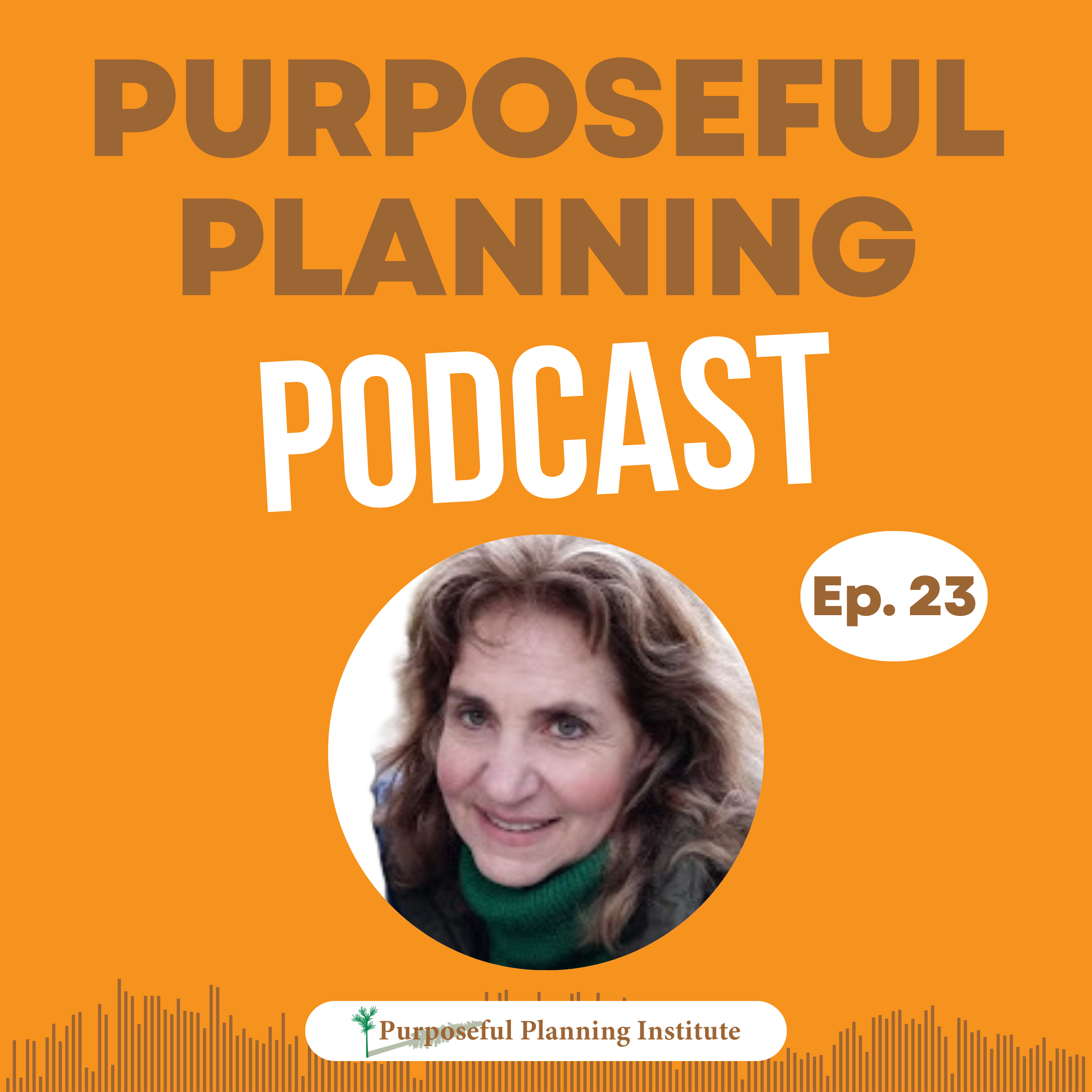JOHN A: Good day everyone. This is John A Warnick, founder of the Purposeful Planning Institute, and it's my deep privilege and honor to introduce to our community, Carol Marak. This practice is called Solo and Smart. And Carol, I'd love to have you if you could just quickly share a little bit of your professional odyssey, how you've gotten to where you are today, and how you're serving today. I think that'd be very interesting to our listeners.
CAROL: Oh, sure. Thank you, John A. I really appreciate the invitation to be interviewed by you and for your audience on this growing topic of aging alone. And how I have come about to serving this market is because I am a solo ager; I am aging alone. I was a family caregiver; well, my sisters and I. It took three of us, three loving daughters, to help both our parents age at home. My mom lived with several chronic illnesses, my dad lived with Alzheimer's, and so it took all three of us almost full time. However, I was working at a real full time job and helping my parents and relieving my sisters from all of the burden that it required taking care of both of them. And it was pretty horrendous in terms of my mom's health because she has several failing chronic illnesses, so it required a lot of doctor and medical treatment attention, so she went to the doctors quite frequently. And so what had happened was once they both passed, which was about seven to ten years out of all three of us giving them constant care, it really hit me over the head because I was reminiscing, looking back at everything that was required of both myself and my sisters to help my parents with, and it just hit me over the head because it showed me, and I thought, “Oh my gosh, what am I going to do?” Because I’m a solo ager, I thought, “I have no child, no adult child, son, daughter, whatever, to look out for me, nor do I have a spouse.”
So I thought, “Oh my gosh.” It really shocked me into reality, and just coming out of caregiving. And fortunately for me, I was 55 at the time, so it gave me ample time to prepare. And several years after that, I launched a Facebook group because I wondered how many other people are like me in this circumstance of aging alone. And I realize, you know what, it's even people who have children, because they can live far apart, and just live at a distance and not be able to take care of either of their parents. So it really comes up to if that individual identifies with the term aging alone or solo aging. So that's what I discovered and that Facebook group is very large and we've fortunately gained a lot of media attention with it. And fortunately, people are starting to wake up. Our society is waking up to some of the issues that people will face. Even if you’re married, these are the issues that we will face as we grow older. So that's it in a nutshell. Thank you.
JOHN A: That's a wonderful story, and I do believe the audience, or the world of the solo ager is much larger than we realize. I'm curious, do you have any estimate of how many seniors there are that are living solo?
CAROL: Yes, I do. And I always fall back to the US Census. And in 2010, the US Census reported that 27% of individuals 65 and older – and this is 65 – are living alone. So that's 27% of the 65+. And in 2020, that has grown now to closer to 31%, so we are growing. And that's the 65. And I keep saying that, because there are many of us. As I understand, between 50 and 65 is closer to about 19 to 20 million people who are aging alone. And by the way, just so you know, AARP did a study with the housing institute in the Smithsonian Housing Institute in Washington, DC back in 2017. They did a study on what we call our housing market here in the US. And the people who are living alone, and we're talking all ages right now (18 and over), the single adult is the fastest growing population or segment in the housing industry today. It used to be that the nuclear family was the largest population, but that's no longer the case. Nuclear family is now 20% of our housing industry, whereas the solo or people who are living alone is 28%. And that was 2017, so I think that probably has increased.
JOHN A: Going up. Yeah, those are great, thank you for those statistics. I think it really does help us measure the market, the opportunity, the need. Carol, what are the key challenges that our clients face when they're aging solo?
CAROL: Oh, gosh, John, it seems like even before this recession has taken hold on our economy, which has really exacerbated it. However, how I like to look at our top issues is – I call them the top ten domains, and those would address your housing and health. I always start with health because that's in the top category. Health and finances are the top two domains that play centric, or are central to our aging well. So there's health, finances, housing, legal matters, then there are social connections, support network, life and life purpose, faith and community (our faith and spirituality), our fun and engagement, and also finding transportation (specially during those times where we are unable to drive) are the top ten domains. Those are the same ones that my parents faced.
JOHN A: It's a beautiful survey of the landscape of need and challenge, and I think there are a lot of opportunities to be addressed there. I remember one of the biggest challenges, which probably is kind of tied into one of those key challenges that you mentioned, maybe two of them, actually. But one of the biggest challenges that my wife and I faced when we were trying to provide caregiver support at a distance from my father and very close up with my mother-in-law when they were in their late 80s and 90s. My mother-in-law lived to be almost 96. My dad was just a few months shy of his 97th birthday. But what we really found to be a constant challenge was caregiver turnover. We just settle in with a quality and qualified caregiver and something would happen in their life which would disrupt their ability to support our parents. So I'm curious what suggestions, what have you seen in terms of this caregiver turnover challenge, and how might we best address that problem, or can we?
CAROL: Well, we have to. And yes, there are ways that we can address it, and that's why I really, really encourage people to start looking at the aging issues that we will likely face. And I say likely, however, it's more like we will face, when we get older. Now, I know it's not a very provocative topic — aging — we all hate to think about it. We all hate the thought of growing old and becoming feeble, not taking care of ourselves, and looking the way we look because of all of our wrinkles, and all of that that goes with aging. However, I had to keep drumming it in to pre-retirees. We have got to start thinking about this as early as 50, if at all possible. I started at 55 and I'm ever grateful because what I did, I knew that I didn't have sons or daughters. And maybe you do, maybe the audience who's listening has sons and daughters and thinks, “Well, my daughter, Mary, will look out for me.” And hopefully she does. However, Mary may live 200 to 1000 miles away from you. Then what? So who will you call to look out for you? And in terms of a specific caregiver, I rather think of it as, let's start thinking about the different ways we can create support right where we live. And that means our neighbors, it means our friends, it means like-minded peers that live in our community.
Now, I'm not saying that we want to rely on our friends to take care of us and to become our caregivers, although that would be nice. But I don't recommend that. It’s a good way to lose your friends, probably. [both laugh] But the point is, there are some strategies and some things that we can put in place like safety check in calls, for example. Do we have someone who texts us frequently, who may call us frequently just to say, “Hi, just checking in to see if you're okay.” Those kinds of support systems to create that right where we live, and hopefully, start getting to know our neighbors and putting yourself in circumstances where people see you. And if they don't see you one day, they start to question, “Well, I wonder what happened to Carol? I haven't seen her since Saturday. And here it is Wednesday. I wonder if she's okay.” So these are simple strategies that we can start thinking about.
Now, in terms of caregiving, that's a tough one. And I think that's something, as a community, we need to start thinking about, start looking at different ways to encourage, or to have caregivers that will actually come into our home. I'm not sure if you're familiar with PAPA, and they have an app that connects older individuals with college students in your community to provide not necessarily hands-on caregiving, but they can come in to run an errand for you, they can do some light cooking, come in and have a companion visit. These young kids that are wanting a part time job, and also they appreciate being and learning from an older individual that perhaps could be their mentor. So that's another kind of outside-the-box thinking. And yes, we need to start thinking of different types of strategies like this. I know of a few people who offer or open up their home to a college student for not necessarily free rent, but low cost rent, and in exchange, that college student will run for errands for them, or they'll do some sort of other type of handy work around the house, for example, or even grocery shopping, right?
JOHN A: That’s a beautifully symbiotic relationship I can see. My dad, I know, he and his twin brother, they lived in the basement of a widow's home. And I remember him describing how they would help the widow. It was a little bit of a bargain on the cost of housing for them with some responsibility. When we find solutions to the caregiving needs, and when we think about all these ten domains that you're talking about, from my father's life, I can see how the fact that he was engaged, he was still cultivating friendships, he was reading to first graders, he had to have somebody drive him to get out to the elementary school, but I think a lot of that meaningful activity in my dad's life contributed to him living as long as he did. And we had a guest on a webinar, maybe ten years ago, who is a bioethicist, and she talked about not end of life planning, but quality of life planning. And I really think that's what we're talking about here. You were kind enough to share with me and I really see the value in it. You've created a Life Plan Assessment that you generously make available. And I'm just wondering if you could take a few minutes to describe that tool, give us a glimpse into its benefits and let our listeners know how they can access it.
CAROL: Oh, absolutely. Thank you, I appreciate that. The Life Plan Assessment is based on my own life plan. I started to assess and evaluate at the age of 55, exactly where I am right now, in terms of the top 10 life domains. And I needed to know, in order for me to age well alone, without relying on family, for example. I knew that wasn't in my future, so I needed to know what do I need to do to prepare to age as best as I can. So I started looking at my finances. I did this quick life assessment for myself. And so what the Life Plan Assessment really does is it helps an individual to identify their weaknesses, where they're falling short, which life domain they are falling short in. And I highly encourage people to know at least their top three life domains, their weaknesses, because you have time then to start improving them. Start doing some small changes, changing your habits, perhaps, or just looking for ways and researching for ways to make improvement.
And I can give you an example. For me, my finances were really bad at the age of 55. However, I had some things in place, which were solid, but I had no emergency fund. I had very little retirement savings. So I focused. It took about five years, but I hired a financial planner, we worked a real stringent plan. I became very frugal and very conservative with my money. And fortunately, within five to six years, I was well. I'm still working on it, and because we all have to pay attention to our money. However, I was in better shape than I was when I was 55 when I started out. And then I looked at my health, and in the top concern, there would be your family medical history to really understand what that is. And are you prone to perhaps having or being diagnosed with the same chronic illnesses? And if you are, then start tackling it right now.
Create a care plan with your doctor and start making improvements for your health. It could be changing your diet, it could be increasing your fitness, it could be mental issues, dealing with depression, your isolation, perhaps. But unfortunately, we cannot sweep these issues under the table. Because if we do, it'll catch up with you. And they'll play havoc on your future. They just will. So the life plan in general, just to give you a quick summation, does ask fifteen questions per life domain. And after you take that, complete the assessment, it will tell you where you're falling short. It'll show you your top risk, your top second risk, and your third risk. And then I will give a report back to you, giving you some ways or steps to rectify them and start making improvements. And then, to go on, I've created a course that will take you into a deeper dive into that.
JOHN A: I stand in awe, Carol, of what you’ve created. It's a real gift to the world. And thank you for the wisdom that you've shared with us. The big takeaway for me today is that we need to start earlier and not wait until we get into crisis moments. The quality of life will be significantly enhanced, and our lifetimes would probably lengthen if we start early with this planning. I’m so grateful that you connected with a financial planner and I tip my hat to all those financial planners who are making contributions to help individuals create purposeful aging moments.
CAROL: Absolutely.
JOHN A: So Carol, if someone wants to reach out and get the Life Plan Assessment, start with that, or to reach out to you, how do they best contact you?
CAROL: Thank you for asking. My website is my name, carolmarak.com. And on the homepage, I actually describe the life plan assessment. So it's easy, accessible, or easy access on my website, carolmarak.com, or you can send an email to
[email protected]
JOHN A: Great. Thank you so much.


